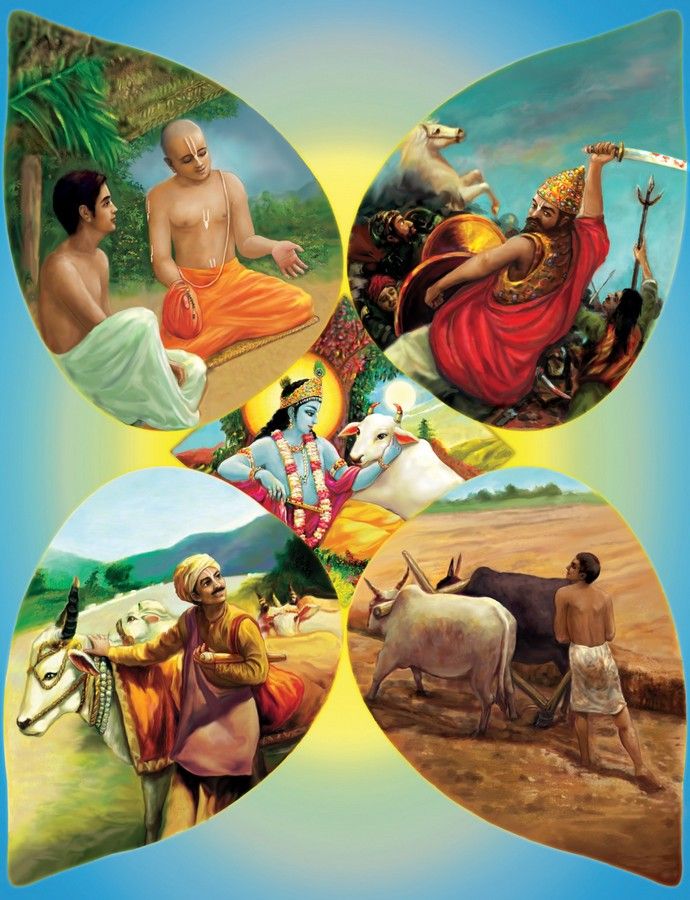Question : 1. What exactly is prescribed duty? Is it also sanatana dharma?
Answer by Romapada Swami:
Human life is a life of responsibility, which means our activities cannot be whimsical. Vedic scriptures prescribe activities to guide how each individual should conduct their life — these constitute prescribed duties. As the term indicates, prescribed duty is to be assigned by superior authorities, not self-created.
Srila Prabhupada elaborates on prescribed duty in BG 2.32 purport as follows:
“There are two kinds of sva-dharmas, specific duties. As long as one is not liberated, one has to perform the duties of his particular body in accordance with religious principles in order to achieve liberation. When one is liberated, one’s sva-dharma — specific duty — becomes spiritual and is not in the material bodily concept. In the bodily conception of life there are specific duties for the brahmanas and kshatriyas respectively, and such duties are unavoidable. Sva-dharma is ordained by the Lord, and this will be clarified in the Fourth Chapter. On the bodily plane sva-dharma is called varnashrama-dharma, or man’s steppingstone for spiritual understanding. Human civilization begins from the stage of varnashrama-dharma, or specific duties in terms of the specific modes of nature of the body obtained. Discharging one’s specific duty in any field of action in accordance with the orders of higher authorities serves to elevate one to a higher status of life.”
Thus for embodied souls, prescribed duty generally refers to varnashrama-dharma. You can find an elaborate exposition of the varnashrama duties for different classes in Bhismadeva’s instructions to Emperor Yudhisthira. (Please see SB 1.9.26 and SB 1.9.27)
The duties prescribed for those in the lower stages of spiritual realization (materialists, or karmis) is different than what is recommended for jnanis, which is different than the duties for a bhakta or devotee. To properly follow the injunctions recommended at one’s own level is called “one’s prescribed duties”. As one progresses spiritually, one should give up the lower duties and accept the duties prescribed for the next stage. (Please find a detailed discussion by Bhaktivinod Thakur in Meditation 49)
Sanatana-dharma refers more generally to the eternal occupation of the soul. ‘Sanatana’ means that which has no beginning or end. The eternal nature of the soul is to always render service. Everyone is serving, but we are presently engaged in temporary occupations or services. When these are purified and we take up our natural, constitutional activities prescribed by the Lord with consciousness fixed upon Him, that is called sanatana dharma.
Daivi varnashrama dharma is considered as sanatana-dharma, because it aims to purify the follower and elevate them in stages to the constitutional position. These two terms are therefore used interchangeably sometimes. The activities of varnashrama are themselves external or material, not eternal, pertaining as they are to the material body and the modes of nature. But when we execute these duties under the guidance of a self-realized soul, it is liberating. Varnashrama dharma is not sectarian or temporary, but is aimed towards preparing us for going back to Godhead, and when executed in that consciousness it constitutes sanatana dharma.
Question: 2. Krishna said in the Gita that sacrifice, charity and austerity are the three things that can even purify great souls. Are these three things also prescribed duty?
Answer by Romapada Swami:
Yes, sacrifice, charity and austerity are part of prescribed duty for everyone.
As discussed above, prescribed duties vary according to one’s position or level of spiritual advancement. In the varnashrama system, a renunciant sannyasi need not perform some of the pious activities and rituals which are obligatory for those in the lower stage of varnashrama. However, Krishna is clarifying in these verses (BG 18.3-6) that sacrifice, charity and austerity are prescribed duties that should not be given up at any stage. What is to be renounced, as one advances spiritually, is not these activities themselves but the selfish desire/motivation in doing these activities.
For instance, those who are very materially inclined are induced in the Vedas with promises of immediate material benefits or elevation to heavenly planets, e.g. performance of a specific sacrifice or austerity to obtain a child or good health etc, or giving charity religiously with the idea that one will get many times in return in the future. An advanced spiritualist is not interested in such sacrifices or charity for fruitive result; but the principle of performing sacrifice itself should never be given up. An advanced spiritualist also performs sacrifices, but his purpose is spiritual advancement, to please Krishna, and for the purification of society and benefit of others. Srila Prabhupada gives his own example in conducting the vivaha-yajna for the spiritual benefit of his disciples, although a sannyasi ordinarily has nothing to do with marriage ceremonies.







